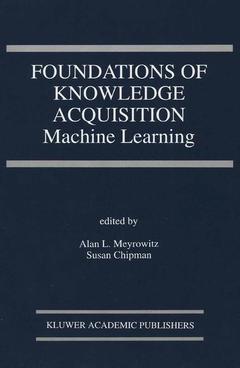Foundations of Knowledge Acquisition, 1993 Machine Learning The Springer International Series in Engineering and Computer Science Series, Vol. 195
Langue : Anglais
Coordonnateurs : Meyrowitz Alan L., Chipman Susan

One of the most intriguing questions about the new computer technology that has appeared over the past few decades is whether we humans will ever be able to make computers learn. As is painfully obvious to even the most casual computer user, most current computers do not. Yet if we could devise learning techniques that enable computers to routinely improve their performance through experience, the impact would be enormous. The result would be an explosion of new computer applications that would suddenly become economically feasible (e. g. , personalized computer assistants that automatically tune themselves to the needs of individual users), and a dramatic improvement in the quality of current computer applications (e. g. , imagine an airline scheduling program that improves its scheduling method based on analyzing past delays). And while the potential economic impact of successful learning methods is sufficient reason to invest in research into machine learning, there is a second significant reason: studying machine learning helps us understand our own human learning abilities and disabilities, leading to the possibility of improved methods in education. While many open questions remain about the methods by which machines and humans might learn, significant progress has been made.
Learning = Inferencing + Memorizing.- Adaptive Inference.- On Integrating Machine Learning with Planning.- The Role of Self-Models in Learning to Plan.- Learning Flexible Concepts Using a Two-Tiered Representation.- Competition-Based Learning.- Problem Solving via Analogical Retrieval and Analogical Search Control.- A View of Computational Learning Theory.- The Probably Approximately Correct (PAC) and Other Learning Models.- On the Automated Discovery of Scientific Theories.
Date de parution : 05-2013
Ouvrage de 334 p.
15.5x23.5 cm
© 2024 LAVOISIER S.A.S.



